$99 Raspberry Pi-sized ‘supercomputer’ touted in Kickstarter project
September 28, 2012

Raspberry Pi-sized board called Parallella puts “supercomputing” power into a $99 package (credit: Adapteva)
Chipmaker Adapteva wants to make parallel computing available to everyone, using a Kickstarter project to raise at least $750,000 and a stretch goal of $3 million, Ars Technica reports.
Adapteva calls it “Parallella: A Supercomputer For Everyone,” a 16-core board hitting 13GHz and 26 gigaflops performance, costing $99 each. If the $3 million goal is hit, Adapteva will make a $199 64-core board hitting 45GHz and 90 gigaflops. (Adapteva seems to be counting GHz on a cumulative basis, adding up all the cores.)
Both include a dual-core ARM A9-based system-on-chip, with the 16- and 64-core RISC chips acting as coprocessors to speed up tasks. The Adapteva architecture hits performance of 70 gigaflops per watt, and 25GHz per watt, the company says.
A pledge of $99 guarantees supporters a 16-core board by May 2013, while a pledge of $499 guarantees delivery by February. The current hardware is in the prototype phase.
Parallella devices would be fully functioning computers, shipping with an Ubuntu 11.10 port to ARM, with 1GB RAM, two USB 2.0 ports, 16GB of MicroSD storage, HDMI, and Gigabit Ethernet. An open source SDK would allow development of applications for Adapteva’s Epiphany architecture using C, C++, and OpenCL. Sizewise, Parallella would be 3.4” x 2.1’’, very similar to the Raspberry Pi.
Olofsson said Parallella will offer anywhere from 10 to 50 times the performance of Raspberry Pi, with the latter figure coming from the potential 64-core version. While it’s three times pricier than the Raspberry Pi, $99 is dramatically cheaper than most parallel computing platforms, he notes. Boards containing Adapteva chips that are already sold by partner company Bittware cost thousands of dollars.
The definition of “supercomputer” is somewhat nebulous. The slowest supercomputer on the Top 500 list hits 61 teraflops. A cluster of 100 16-core Parallellas would cost $10,000 and provide 10 teraflops, Olofsson said. Whether or not you call it a supercomputer, it could be useful to many people.